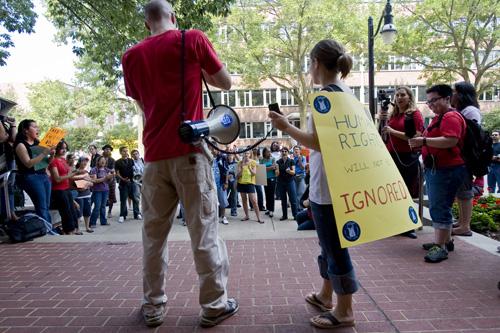Restoring the nuclear family

September 20, 2007
One mistake can ruin a relationship, especially if that mistake is a catastrophic nuclear meltdown. More than two decades after Chernobyl’s inconsiderate outburst, Americans are still estranged with nuclear power. Fortunately, we’re beginning to realize nuclear power’s true character and see it as a solution to our energy situation.
After the mishaps of Three Mile Island and Chernobyl, the U.S. public fostered an aversion to all things nuclear, driving our energy market into the arms of the fossil fuel dependence we see today.
That fear, which may have been appropriate at one time, is all but inconsequential now. Chernobyl’s relevance today is questionable considering the Russians’ less-than-competent methodology, and the Three Mile Island “disaster” just demonstrated the effectiveness of the safety system.
We’re still apprehensive after two decades that could be called the most productive in human history. People still doubt our ability to not only contain a nuclear reaction, but also defend a nuclear installation.
Security is often brought up as an issue with the idea that these power-generating plants are nothing more than bombs behind walls. However, a meltdown at a nuclear plant, while definitely not trivial, is hardly a mushroom cloud. The ability to contain and avert a meltdown has grown over time, with preventive technologies almost unanimously considered foolproof.
Get The Daily Illini in your inbox!
As for security, with the right policies we won’t have to worry about terrorist landfall, and definitely not attacks on nuclear plants.
The strengths of nuclear power are evident with France’s energy situation. Approximately 75 percent of its energy consumption comes from nuclear power plants and the benefits are clear to see.
France is able to export its energy to other countries, making it the largest exporter of energy in the world. Every year France squeezes more energy out of its plants while maintaining stellar carbon emission rates.
Even so, some people just can’t be pleased. Environmental groups have literally taken up arms over the issue of nuclear power. In 1982, Cha’m Nissim attacked the then in-progress Superphenix French reactor, halting production. It was a sad case of foolish folks attacking technology they didn’t understand. Nuclear power has been used with no carbon emissions and no major incidents for 20 years, with ever-increasing performance- – hardly what I would call an affront to nature.
With the right policy decisions, the U.S. can wean itself off of unpredictable fossil fuels. In fact, the abundance of uranium in North America all but guarantees it. With nuclear non-proliferation treaties spreading, it’s possible to convert many dismantled nuclear warheads into fuel. Repealing the ban on reprocessing and recycling uranium will make it all more efficient. There are too many ways we can modernize our energy grid to list but hopefully the point is getting across.
With energy demand growing at such a rapid pace, it’s clear that we’re at the end of the road.
Some options exist, but none are as enticing and feasible as expanding our nuclear power program. We’ve started turning our glance back to nuclear power in policy but the most important factor, the public, has yet to embrace their nuclear friend.
The Cold War is over, and technology has changed the field – let’s not let ignorance keep us from welcoming what may become our best friend in the years to come.






